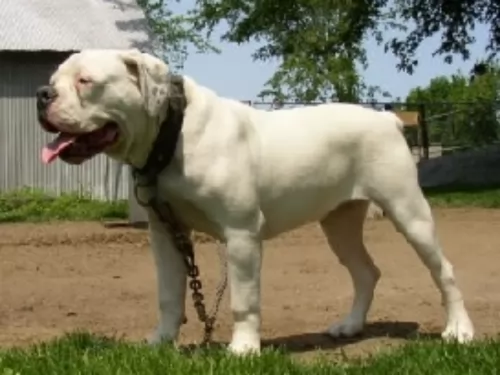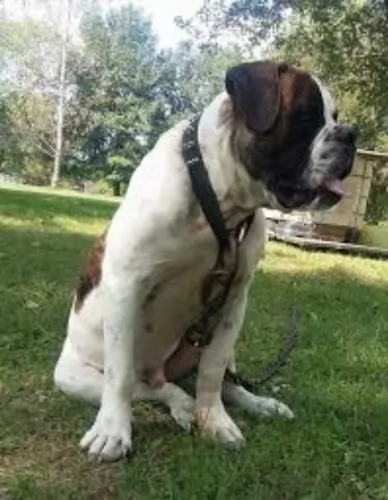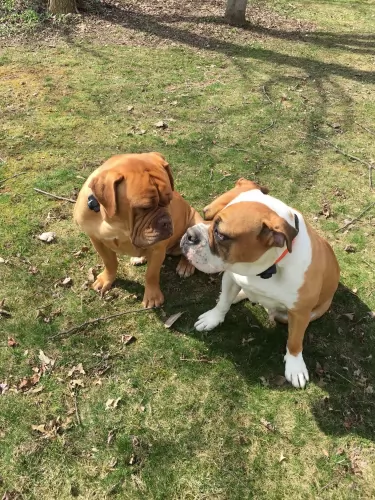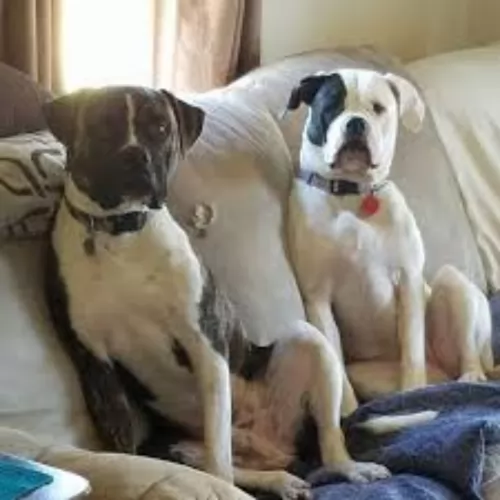 Petzlover
Petzlover Hermes Bulldogge is originated from United States but Pembroke Welsh Corgi is originated from United Kingdom. Hermes Bulldogge may grow 33 cm / 13 inches higher than Pembroke Welsh Corgi. Hermes Bulldogge may weigh 54 kg / 120 pounds more than Pembroke Welsh Corgi. Both Hermes Bulldogge and Pembroke Welsh Corgi has same life span. Both Hermes Bulldogge and Pembroke Welsh Corgi has same litter size. Hermes Bulldogge requires Low Maintenance. But Pembroke Welsh Corgi requires Moderate Maintenance
Hermes Bulldogge is originated from United States but Pembroke Welsh Corgi is originated from United Kingdom. Hermes Bulldogge may grow 33 cm / 13 inches higher than Pembroke Welsh Corgi. Hermes Bulldogge may weigh 54 kg / 120 pounds more than Pembroke Welsh Corgi. Both Hermes Bulldogge and Pembroke Welsh Corgi has same life span. Both Hermes Bulldogge and Pembroke Welsh Corgi has same litter size. Hermes Bulldogge requires Low Maintenance. But Pembroke Welsh Corgi requires Moderate Maintenance
 The Hermes Bulldogge is not a breed in itself, but is actually a line within the English Bulldogge line. The Hermes family in the United States bred this line for several years. The Hermes Bulldogge line is the largest of the re-creations from the English Bulldogge. They are inspired by the arena dogs from the days of the Roman Empire. Greg and Linda Hermes have bred healthy, smart, resilient and agile dogs. The desire of the Hermes was an attempt at recreating the 17th century dog.
The Hermes Bulldogge is not a breed in itself, but is actually a line within the English Bulldogge line. The Hermes family in the United States bred this line for several years. The Hermes Bulldogge line is the largest of the re-creations from the English Bulldogge. They are inspired by the arena dogs from the days of the Roman Empire. Greg and Linda Hermes have bred healthy, smart, resilient and agile dogs. The desire of the Hermes was an attempt at recreating the 17th century dog.
They used a variety of breeds to create the Hermes Bulldogge, most of whom are never disclosed. Some of the dogs that were probably used include: English Mastiffs, American Bulldogs, Old English Bulldogges, and pit Bull Terriers. This family of dogs are playful, friendly, and good family dogs. They have a strong prey drive which makes them good hunters but not as good around other small animals or small children. The Hermes have been breeding the Hermes Bulldogge since since 1983. The puppies are all hand raised, child friendly with great health.
When discussing the Hermes Bulldogge, one must go back to the root of the English Bulldogge. That breed comes originally from England and various lines have been recreated by various breeders. The breeding of the Old English Bulldogge with Mastiffs and Pits lead to other lines that the breeders called Old English. But most fanciers believe that only two lines of the original Old English Bulldogge remain and that is the Leavitt and the Hermes.
Some form of bulldog has been in existence since 700 years ago and as it was mixed with a variety of other breeds it took on other forms over time. The English Bulldogge was a definite couch potato. Instead of being bred for a job or look, the Bulldogge was developed with temperament, ability and health in mind. This has made for a great family dog without a lot of veterinarian bills.
 The Pembroke Welsh Corgi is known as an achondroplastic, a dwarf breed, and they come from Pembrokeshire in Wales. Not much is known of the dog's history but it is believed that the dogs came over with Flemish weavers who settled in Pembrokeshire way back in the 12th century already.
The Pembroke Welsh Corgi is known as an achondroplastic, a dwarf breed, and they come from Pembrokeshire in Wales. Not much is known of the dog's history but it is believed that the dogs came over with Flemish weavers who settled in Pembrokeshire way back in the 12th century already.
This dog breed has always been a cattle herding dog. Their fame has come from them being a favorite dog breed for the British royals and particularly of Queen Elizabeth II.
 The Hermes Bulldogge, much like the original Olde English Bulldogge, is taller, healthier, more athletic than the original English Bulldog. They are medium height, with a large head, a strong body and a deep, wide chest and broad shoulders. Tails might or might not be docked but the ears are never docked. They n have a moderate amount of wrinkles and a longer, less smashed face than the original. It is easier for the Hermes Bulldogge to breath, to fly and to live in warmer environments that it is for the English Bulldogge. His eyes are lower in his head but in the front center.
The Hermes Bulldogge, much like the original Olde English Bulldogge, is taller, healthier, more athletic than the original English Bulldog. They are medium height, with a large head, a strong body and a deep, wide chest and broad shoulders. Tails might or might not be docked but the ears are never docked. They n have a moderate amount of wrinkles and a longer, less smashed face than the original. It is easier for the Hermes Bulldogge to breath, to fly and to live in warmer environments that it is for the English Bulldogge. His eyes are lower in his head but in the front center.
They are very dark almost black. Eyelids should cover the white of the eye and they have rounded cheeks. They have a short muzzle and short face. Broad, thick lips finish out the face with very large, square, broad jaws.
 The Pembroke Welsh stands at between 25 and 30cm in height and weighs between 11 and 14kg.
The Pembroke Welsh stands at between 25 and 30cm in height and weighs between 11 and 14kg.
The coat is thick and shortish and can be fawn or a mix of colors such as white, cream, tan and black. The coat sheds quite a bit. Some of these dogs are born with their tail naturally short while others have the tail docked to give it that distinct look.
Pembroke Welsh Corgis are loving dogs and with their human families, they want to become involved with their lives. They like to please their owners and are therefore easy to train and socialize, becoming very obedient and amicable.
They’re alert, intelligent dogs and make great watchdogs too. They get on well with other pets in the home as well as children.
 If socialized properly this line of bulldog is harmful to me.
If socialized properly this line of bulldog is harmful to me.
Strong and athletic, his strength and stamina.
He is not very adaptable. Apartments are not good for this dog. He needs to run and if possible to hunt.
He is very intelligent but stubborn which affects his learning ability.
 British royalty has always loved the Pembroke Welsh Corgi and why not? He is loving, energetic, feisty, gentle, calm, friendly and intelligent.
British royalty has always loved the Pembroke Welsh Corgi and why not? He is loving, energetic, feisty, gentle, calm, friendly and intelligent.
Able to adapt to life in the city or the countryside, he will however need to be exercised every day as he has always been a herding- and working dog, used to working.
If you’re willing to bring the Pembroke Welsh Corgi into your home, he’ll show you what a splendid pet and companion he can be for you too.
 The Hermes Bulldogge is healthier than most bulldogs. His face is not as smashed and he is not as wrinkled. He can breathe easier than other Bulldogs. The two major concerns are hip dysplasia and bloat.
The Hermes Bulldogge is healthier than most bulldogs. His face is not as smashed and he is not as wrinkled. He can breathe easier than other Bulldogs. The two major concerns are hip dysplasia and bloat.
Hip Dysplasia also some elbow dysplasia: can cause lameness and arthritis
Terminal unless treated immediately. Can be prevented by not feeding large meals before or after heavy exercise.
 Pembrokes can live to be between 12 to 15 years. With good care they can live to be a ripe old age, but just like with any other dog, they can become ill with any of the many common dog illnesses there are.
Pembrokes can live to be between 12 to 15 years. With good care they can live to be a ripe old age, but just like with any other dog, they can become ill with any of the many common dog illnesses there are.
Some of these diseases are hip dysplasia, monorchidism and degenerative myelopathy. Being a small or short dog, they are also prone to obesity.
This is a condition where only one testicle descends and the other isn’t able to descend into the scrotum. Both testicles should be in the scrotum by 2 months of age. Monorchidism is usually genetic and you may find your dog licking his genital area quite a bit.
If you suspect your dog has monorchidism, you will need to make an appointment with your veterinarian.
This is a progressive disease of the spinal cord and is usually seen in older dogs, starting with your dog losing coordination in the hind limbs.You’ll notice your dog dragging his feet.
As the disease progresses, the limbs weaken and the dog even has difficulty with standing. Eventually the dog is unable to walk. With time your pet even suffers with urinary and fecal incontinence. Fortunately it isn’t a painful disease but you will want to speak to your vet for advice.
 When feeding a Hermes Bulldogge puppy be sure you feed puppy meal for bulldogs or medium dogs. For first year fee 2-4 times a day 2 cups food.
When feeding a Hermes Bulldogge puppy be sure you feed puppy meal for bulldogs or medium dogs. For first year fee 2-4 times a day 2 cups food.
Feed the adult a solid adult dry food. 2 cups twice a day.
Better health than most lines of Bulldogs. Few wrinkles and less problems breathing as he doesn’t have a smashed face.
He doesn’t need a lot of exercise but daily walks and lots of play time. He can enjoy Lure Coursing obedience, agility and obedience
 If you bring a puppy home, make sure he gets his puppy vaccines at 8 weeks of age.
If you bring a puppy home, make sure he gets his puppy vaccines at 8 weeks of age.
Your puppy requires 4 meals a day. Make sure to always give your pet the best quality food there is to ensure his health. Avoid giving him spicy, human food. Dogs like simple, consistent diets which don’t upset the stomach. If you buy him commercially manufactured food, buy the best quality one that isn’t full of preservatives, colorants and fillers. Try and mix in some homemade food occasionally such as chopped up boiled chicken, brown rice or pasta and some cooked vegetables such as sweet potato, spinach and carrots. A little bit of raw meat occasionally will do wonders for your pet and he will have more energy, a shinier coat, less skin allergies and less inflammation.
Always ensure your pet has a constant supply of fresh, cool water.
Brush the Pembroke Welsh Corgi’s hair twice a week. Feel for any unusual lumps while doing this. Check inside and outside his ears for ticks and fleas and ear infections.
Trim his nails.
Make sure if he goes outside that he has a shady spot to lie down in.
Exercise him. Take him on walks.
Give him your love and attention.
Take him to the vet when you can see that he is sick.
Have your dog spayed or neutered if you don’t intend for it to have puppies.